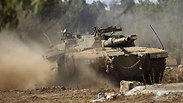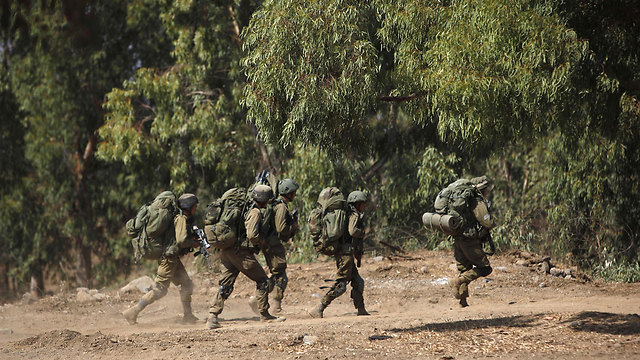
The corps exercise taking place in the Northern Command these days
צילום: AFP
Exercises are important, but war is the real test
Op-ed: While Israel should definitely demonstrate its strength vis-à-vis the Lebanese government and Hezbollah, and emphasize its messages and intentions, the military exercise conducted by the IDF these days has the potential of lulling the public into a state of complacency and self-satisfaction.
When the IDF flexes its muscles on the northern border and talks about defeating Hezbollah in a military operation, we should go back to 2006 to get some proportions about the gap between rhetoric and performance abilities. While it’s very important for Israel to demonstrate its strength vis-à-vis the Lebanese government and Hezbollah, and emphasize its messages and intentions, the sterile exercise conducted by the army these days has the potential of lulling the public into a state of complacency and self-satisfaction.
One of the events stressing the IDF’s failed performance in 2006 took place in a conference that was held by the army about a year ago to mark a decade since the Second Lebanon War. The lessons raised in that conference were, naturally, not shared with the public.
One of the panels included the division commanders during the war, who presented their personal lessons to the audience of officers. They were faced by two people who accused them of disobeying orders. The accusers were not ranting Knesset members or good-for-nothing journalists, but the chief of staff during the war, Dan Halutz, and current Chief of Staff Gadi Eisenkot, who served as head of the Operations Branch in 2006 and was in fact the person who issued those orders which were disobeyed to the Northern Command.
Halutz and Eisenkot argued that the division commanders sitting on the stage with them had received an order to carry out a bi-divisional attack, and failed to do so for some reason. While the bi-divisional attack on Jabal Hamamis was allegedly started, it was halted very quickly after one of the division commanders decided that the conditions made it impossible for him to carry out the mission and asked the command chief to stop. The attack was halted and was never resumed.
There’s no doubt that during the exercises that preceded that war, the same division commander carried out his missions in an exceptional manner, in any type of weather and under every possible condition, and destroyed the enemy—and this is exactly where we can find the gap between military officials’ rhetoric and their performance abilities.
This is only one case of a failure to obey the chief of staff’s orders, in letter and spirit, in that war—yet two of the division commanders sitting in that panel had the ranks of major-general on their shoulders. In other words, although the chief of staff reached the conclusion that his officers had failed to carry out his orders, they were promoted to the top of the pyramid. This is already part of another big problem in the military organization—drawing conclusions, including personal conclusions.
In exercises, these problems don’t exist. The military official’s real test, which he prepares for throughout his entire career and receives his real grade in, is the war. It’s neither a maneuver nor an exercise. Whoever fails the real test should retire. But that hasn’t happened, and likely won’t happen.
Chief of Staff Eisenkot has argued and keeps arguing that the Second Lebanon War was a strategic victory, and the proof is the calm we got on the northern front. He may be right, but the strategic achievement was reached in spite of the military echelon’s problematic performance. The military failure was in the senior field command—and as long as the army won’t admit it, it won’t learn a thing, even in the current exercise.
The corps exercise taking place in the Northern Command these days essentially replaces the General Staff exercise which is held by the army on an annual basis. This year it was decided, for budgetary or organizational reasons most likely, to carry out a corps exercise. While it’s being carried out on a wider scale than usual, it’s still two levels below the General Staff’s view.
The current exercise sees only one battlefield. It may be a main battlefield, but even the optimistic evaluations of the situation point to at least two fronts when the fighting erupts: The Palestinian and the Lebanese. Moreover, what is currently perceived as the Syrian front—which is marginal in the fighting—may turn into the main front against pro-Iranian forces. The exercise must also indicate whether the five-year Gideon Plan developed by the chief of staff has indeed shaped an army which is capable of tackling three different fronts simultaneously.
Exercises are important, information is important, deterrence is important, and propaganda for that purpose is inevitable—but we must not get confused.











